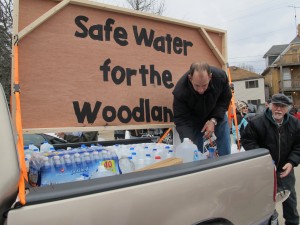Pa. Auditor General: Don't rely on DEP for good information

Susan Phillips / StateImpact Pennsylvania
A man helps deliver donations of clean water to residents of Butler County who say gas drilling polluted their water supply. DEP officials had told residents that nearby drilling was not the cause. But gave no other explanation.
Pennsylvania’s Department of Environmental Protection is having a rough week. On Thursday, the Attorney General’s office showed reporters evidence of how DEP Secretary Chris Abruzzo exchanged pornographic emails with his pals on taxpayer time. And now, another state agency, the Auditor General’s office, has released a “citizens guide” to shale gas water complaints warning Pennsylvanians not to trust information on the DEP’s website.
In an audit released back in July, the Auditor General described DEP’s ineptitude when it comes to investigating and acting upon shale gas related water complaints from citizens. Sloppy record-keeping, lax oversight, and poor communication with citizens topped the list of findings. So perhaps it’s not surprising that “Shale Gas Development and Water Quality Complaints — A Citizen’s Guide” urges caution when relying on DEP for accurate information.
“Users should exercise caution in accessing any information from DEP’s website as the information may not be accurate and may not be representative of actual conditions. DEP frequently posts data it obtains directly from operators without checking to see if the data is valid and reliable. In particular, drilling dates (or spud dates) may be inaccurate on DEP’s website. As we found in our audit work, the only way to really know when critical drilling activity occurred on a site is to conduct a file review at the applicable district oil and gas office or to speak with an operator’s representative.”
The guide advises residents to keep good records and insist on a complaint identification number when informing DEP of a suspected problem with water supplies. And it urges citizens demand a detailed, written description of the investigation. It also encourages residents to allow operators to test their water prior to any drilling activity.
















